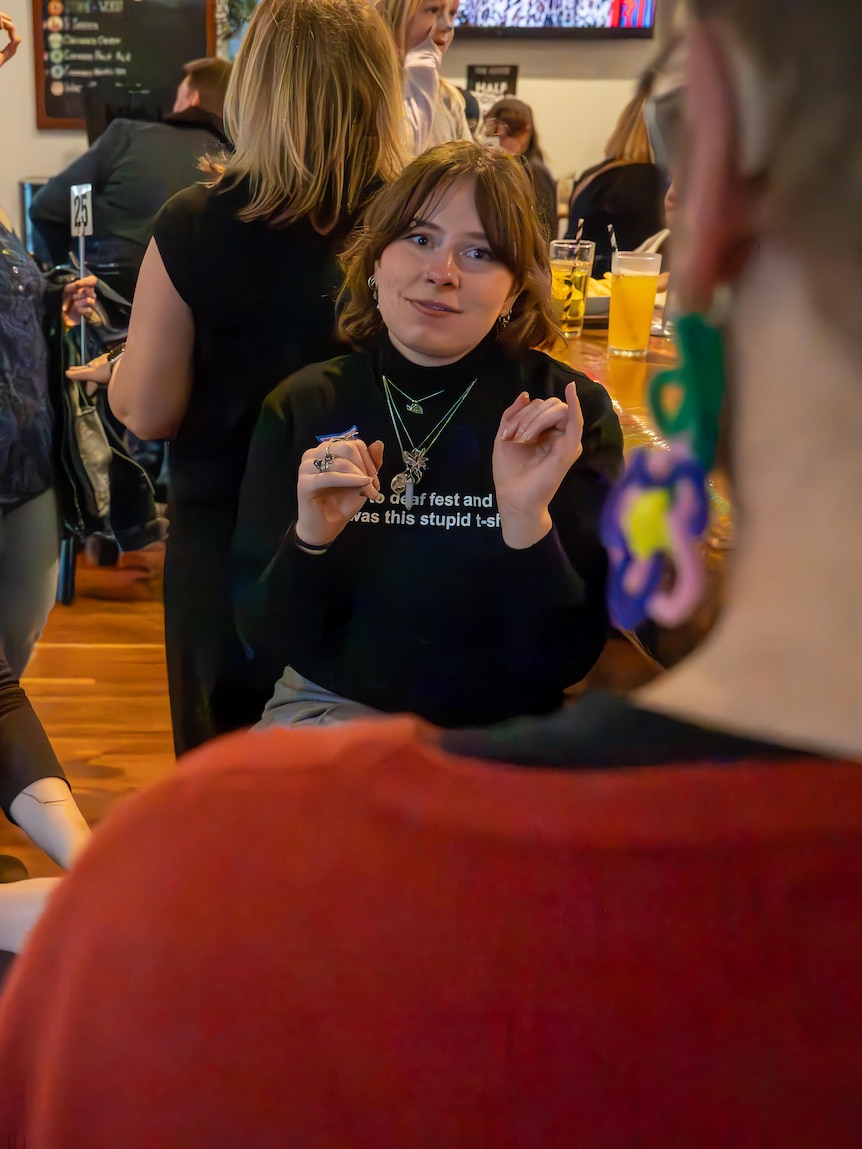When Gail and Neville Pittaway head to the pub with their mates, it is mostly quiet, other than laughter.
It is because they are chatting with their friends using sign language.
The couple are both deaf and neither used Auslan until they were older.
“When I was little, we weren’t allowed to use sign language at all … we had to lip read, we had to speak,” Mr Pittaway said.
Neville and Gail Pittaway joined Voices Off to connect with others using Auslan. (ABC News: Brant Cumming)
“I had very little Auslan growing up. Later in life, I found that I wanted to learn,” Mrs Pittaway said.
For the past two years, they have been meeting up once a month at the local pub, as part of a group in Adelaide called Voices Off.
Supported by Deaf-owned business The Deaf Butterfly Effect, the social group gives people an opportunity to chat, practise and learn Auslan in a social setting.
“I still feel more confident now, but only a little bit, but I’m still learning,” Mr Pittaway said.
Co-founders of Voices Off, Kiara Murphy and Eve Marlow, have helped to foster a space where people who are fluent or just learning Auslan can chat and head to the pub with their mates.
Eve Marlow says Voices Off gives people of all abilities a place to socialise. (ABC News: Brant Cumming)
Ms Marlow, who is a hearing person and did not know Auslan before starting Voices Off, said the group helped people of all abilities and those who did not know how to sign to feel welcome, with options such as pen and paper to use.
“We wanted hearing people to feel like they had easy access to the community to get involved,” Ms Marlow said.
“We wanted deaf people to feel like they had a Deaf, Auslan-friendly space where they could come, socialise, meet people and just have a drink. Everybody wants that.”
Ms Murphy said they tried to make their events “as accessible as possible” for people at different fluency levels.
“Whether you’re a native signer who has been signing since day dot, or someone who has just had their first class yesterday … we wanted to create that safe space,” Ms Murphy said.
Kiara Murphy says Voices Off is for Auslan beginners through to native users. (ABC News: Brant Cumming)
Ms Murphy is what is known as a GODA, or a grandchild of deaf adults, and Auslan was her first language despite being able to hear.
“It’s always been in my life … but then when I got to my teen years, friends are more important and school, and my skills really fell backwards and I lost fluency,” she said.
“Then when I became an adult, I thought, ‘It’s super important for me and it’s important for my family. I want to be able to communicate,’ and that’s when I started [studying] to regain that fluency.”
Ramas McRae is undertaking his PhD into how learning Auslan can improve mental health outcomes, particularly for deaf children of hearing adults.
He said without language tools such as Auslan around them, people who were deaf or hard of hearing could experience loneliness or exclusion.
Ramas McRae says social groups can help deaf people feel less lonely. (ABC News: Sophie Holder)
He said organisations and groups such as Voices Off could offer ways to improve communication and connection.
“The opportunity to socialise and communicate provides an opportunity to share information and awareness, to find out about deaf people’s lives,” he said.
“I think that’s really really significant.”
For the Pittaways, they are hopeful that with more people learning Auslan, it will help increase the number of services available for deaf people.
“It’s better for deaf people, so that people can understand why it is that they should learn Auslan, for us, we do need more interpreters in society,” Mrs Pittaway said.
“If we have more people learning Auslan, we will gain more confidence in ourselves.”




